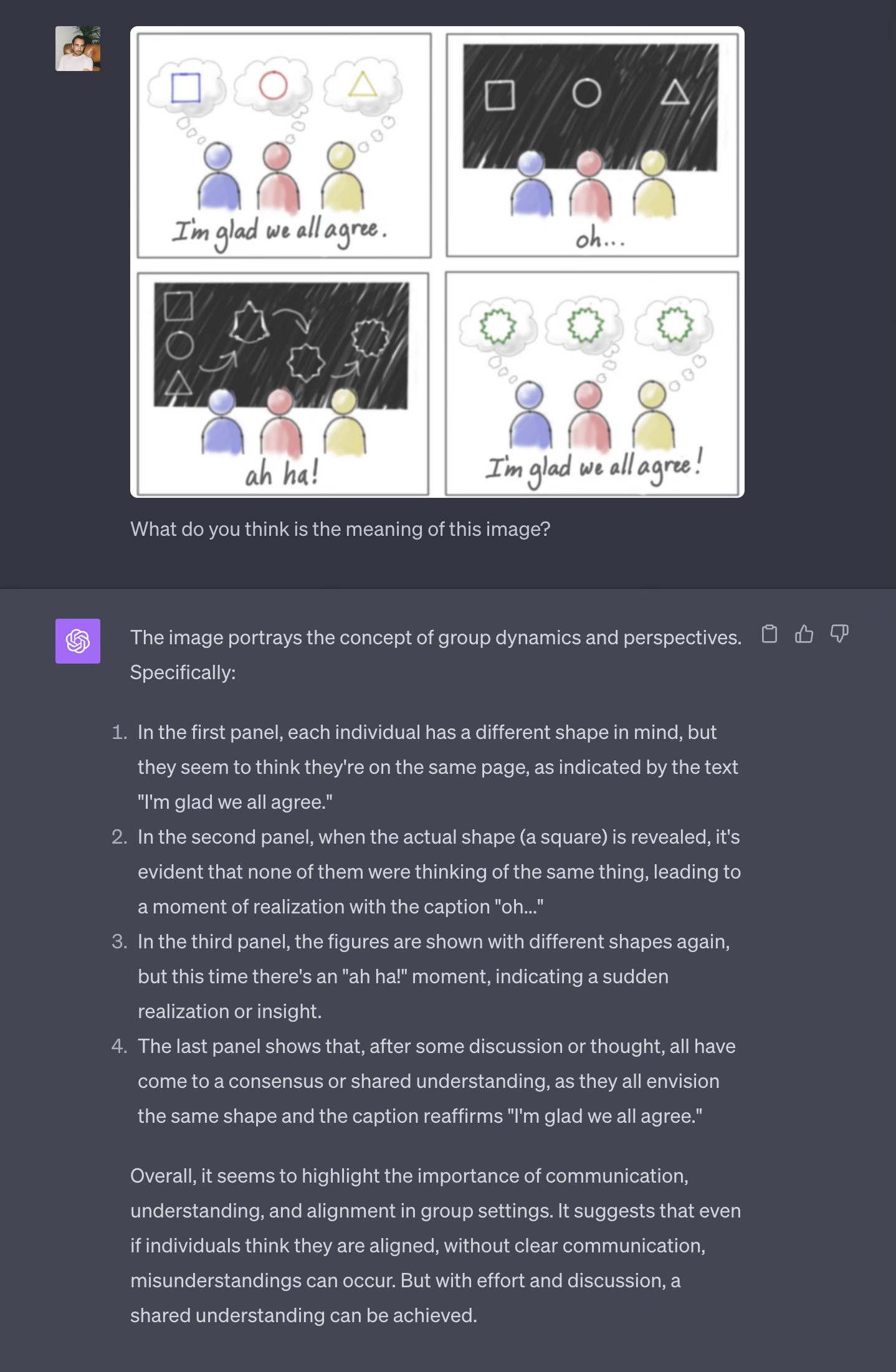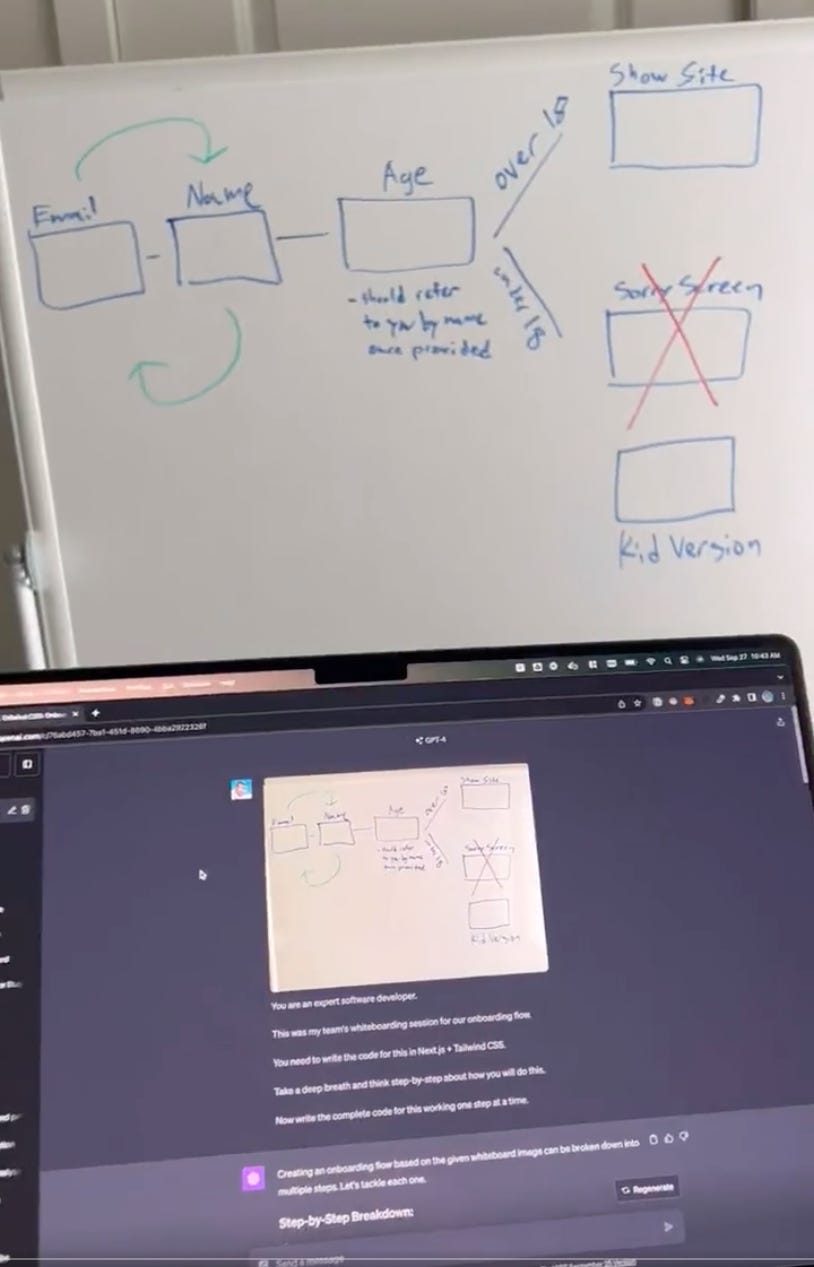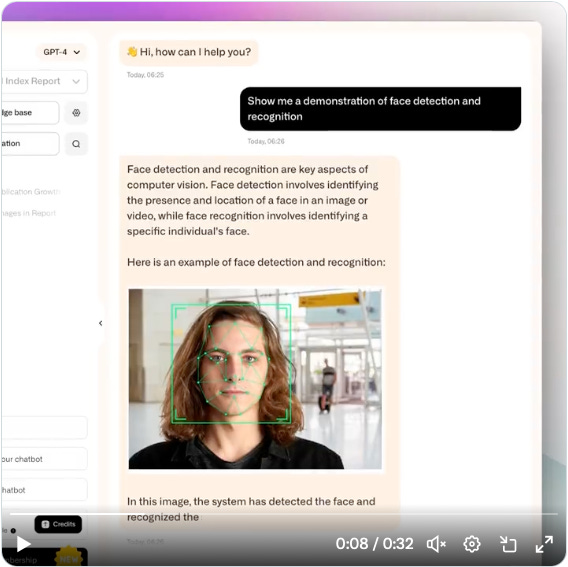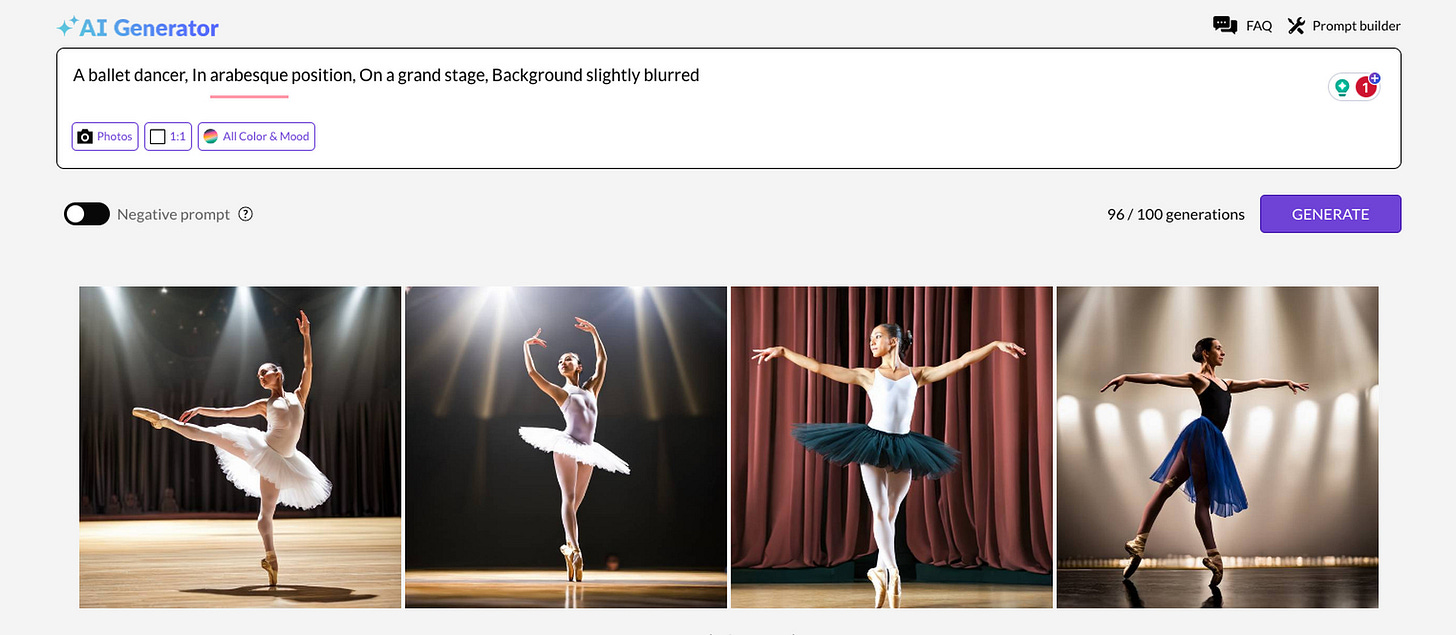Explosive AI breakthroughs unveiled this week
A tectonic shift is coming to education, and it's powered by AI
It's been a monumental week for new AI tech across the industry. We're stepping into a time where AI is everywhere. I'll cover as much as I can, sharing my thoughts on how these updates will affect the EdTech scene and where it might lead us.
ChatGPT goes multimodal
OpenAI rolled out updates for speech and image recognition. Among these, image recognition has made the most significant impact on the community to date. Additionally, the advancements in voice conversation technology are bringing us a step closer to more natural interactions between humans and robots.
Image recognition is “magical”
ChatGPT now goes beyond just text recognition in an image; it also explains every part of an image of a human cell, much like a tutor would:
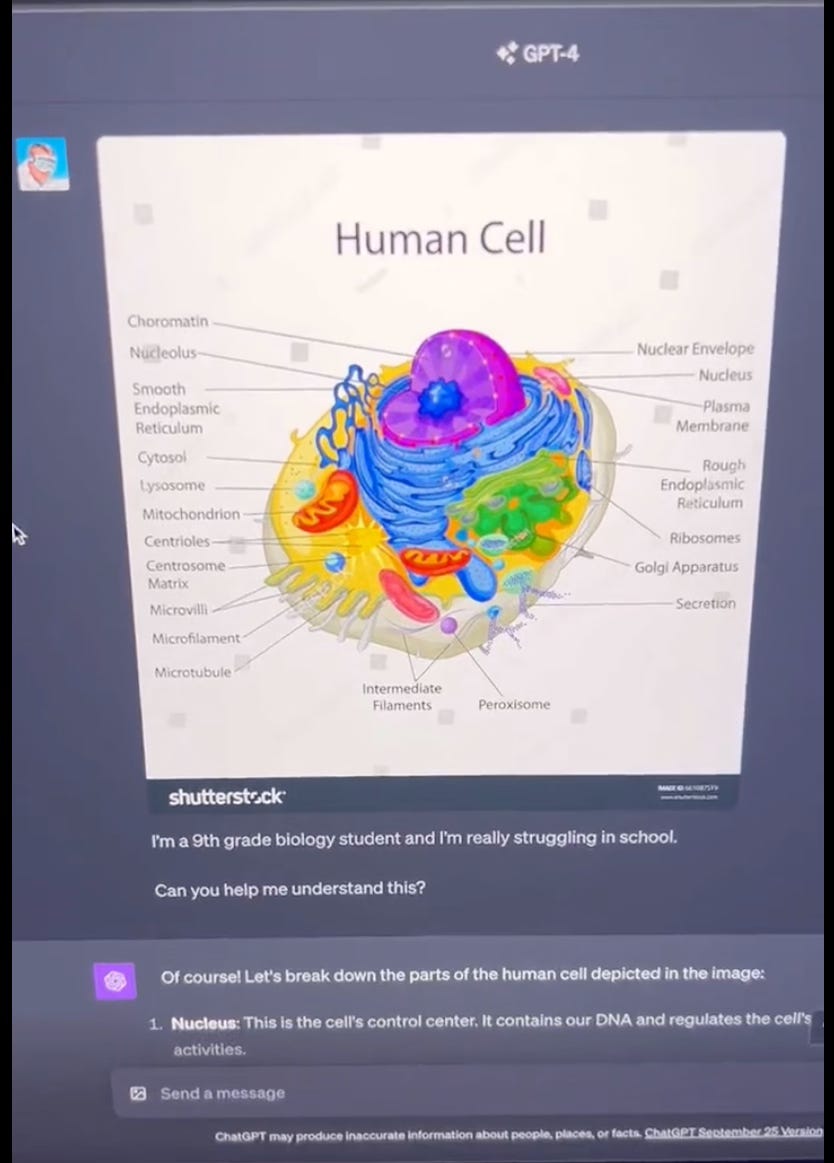
It extends its capability further, demonstrating an understanding of complex concepts, as seen in this example:
It also appears proficient at grasping flowcharts, workflows and discerning the logical connections between processes:
And it performs well in recognising handwriting (see image below). Maybe this could be used as a study aid in Free recall sessions, where a student could draw a MindMap while recalling a topic, and an AI mentor could assist in filling in the gaps. I won’t be able to verify if this is effective until I have access to the image recognition feature, so a thorough assessment will have to wait until then. For more insights on this technique, please refer to my previous article:
In another instance, a Pro user uploaded a screenshot of a SaaS dashboard UI and tasked ChatGPT with writing the code for it!
It's precisely for this reason I envision a future where all software will be Open Source: AI generated rip offs of will eventually get good enough to replace closed source incumbents.
DALL·E 3: Goodbye prompts, hello text

OpenAI’s image generation service DALL·E 3 will use ChatGPT to generate tailored, detailed prompts so you don't have to; which previously necessitated users to learn prompt engineering. If you like a particular image, but it’s not quite right, you can ask ChatGPT to make tweaks with just a few words.
Furthermore, this new feature allows for the insertion of text within images. This advancement could revolutionise the workflow for Graphic Designers in EdTech, whose primary task often revolves around creating text-rich images.
Currently in research preview, this feature is set to launch for ChatGPT Plus and Enterprise users come October.
The Metaverse and AI tutor avatars: Future of education?
Often roasted for his metaverse tech demos, Zuckerberg appears to have blown away internet users with his latest avatar tech in 3D metaverse.
In a recent podcast episode, Mark Zuckerberg and Lex Fridman showcased the potential of the metaverse through a conversation using photorealistic avatars, facilitated by Meta's technology. While critics had been skeptical of Meta's metaverse, this demonstration impressed many with its realistic interaction. The technology, Codec Avatars, aims for fully photorealistic, real-time avatars, although mainstream adoption may still be a few years away due to high technical requirements.
Photorealistic avatars and immersive metaverse environments could provide a more humanised and realistic online learning experience, facilitating better student-teacher and peer interactions.
Zuckerberg also mentioned they are working on AI avatars that could be summoned into a virtual meeting space. The infusion of a capable AI tutor into a realistic 3D avatar would be amazing.
This development could potentially elevate the effectiveness of online education, bringing it closer to the impact of traditional in-person learning. However, with a $500 price tag for the new Oculus 3 headset, I still believe VR for mass education remains out of reach for most. There needs to be a pivotal event at the scale of mobile phone proliferation for AR/VR to appeal to all. Nonetheless, I can envision this technology taking off within the realm of remote work.

No mention of teacher or tutor AI bots in Meta's recent AI news release is notable. It perhaps underscores the existing limitations of AI models, which may not yet be at a point where they can be relied upon as authoritative sources for teaching. The risk of confabulation - the generation of fabricated, distorted, or misinterpreted information - poses a significant challenge, potentially undermining the trust and accuracy essential in an educational setting.
Despite the breathtaking advancements in AI, this silence could be a nod to a cautious approach, acknowledging that the technology hasn't fully matured to a point where it can replace or emulate the nuanced understanding and guidance provided by human educators.
Other AI news
Exciting Update from Dante AI.
Dante AI is an advanced custom AI chatbot service, trained on your own data. It’s a promising chatbot platform with potential applications in educational settings.
I may delve into a separate post on Dante AI, exploring its integration into existing Learning Management System (LMS) platforms, should there be interest.
There's an update this week where images from your uploaded documents or courseware are rendered in chat. Students can simply request an image by description. Neat!
Microsoft release AI prompts for education
Microsoft has curated a prompt library tailored for GPT-4, aimed at serving educators, students, and administrators alike. This could be a valuable resource for Instructional Designers and students. I am certainly looking forward to contributing my own prompts to this growing repository.
Microsoft releases AutoGen: AI agents
If you think AI chatBots are amazing, combining them to work together on a goal pushes what LLMs can do to another level. This is what Microsoft have done with their open source AutoGen codebase that allows developers create AI agents with goal setting and human intervention.
AI agents are software entities that autonomously perform tasks in a specific environment. They gather data, make decisions based on that data, and then act. Some can also learn from their actions to improve future performance. Their primary purpose is to achieve particular goals, like making financial decisions, or navigating a self-driving car.
The areas where I see the most potential for AI agents in education are:
Content Creation: AI agents can aid in developing educational content and ensuring its accessibility.
Engagement: More realistic games and simulations can be created using different AI personalities or by incorporating devil's advocate viewpoints.
Getty made an AI generator that only trained on its licensed images
Getty Images, in collaboration with Nvidia, has launched a new tool called Generative AI by Getty Images, allowing users to create images utilizing Getty's library of licensed photos. The AI tool, trained solely on Getty's extensive image library, provides users full copyright indemnification for commercial use of the generated images. It is integrated with Nvidia's Edify model, excels in rendering realistic human figures, although its illustration mode delivers more basic 2D renderings. The tool is priced based on prompt volume, separate from standard Getty Images subscriptions. Users gain perpetual, worldwide, and unlimited rights to the images they create with this tool, which also offers an API for integration into other workflows. More…
Final thought: Are AI chatbots laying the foundation for a new type of Operating System?
Andrej Karpathy of OpenAI, formally director of AI Tesla suggests that advanced language models (LLMs) like ChatGPT or Google’s PaLM are becoming more like the core part of a new kind of computer system (like Windows or OS X), rather than just chat tools. They handle various tasks such as managing text, sound, and visuals, running code, accessing the internet, and storing/retrieving information. The idea is that just as early computers were more than calculators, these LLMs are shaping up to be the foundation of a new computing era, not just chat helpers.
Will writing prompts take over software languages? Is English set to become the newest coding language? Are LLM chat interfaces poised to transform software UI as we know it?
Thanks for reading. Please let me know if you would like me to continue writing up these weekly reviews. I really appreciate if you could subscribe and share this article. 🙏


